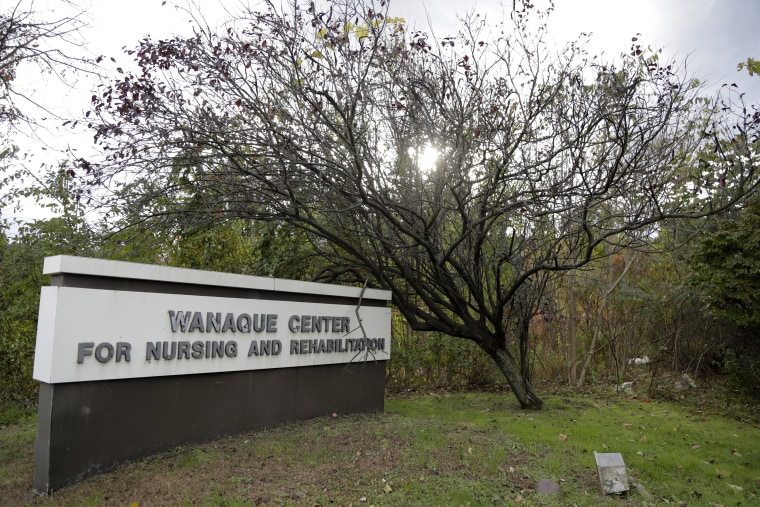A team of infection control experts will head to a New Jersey rehabilitation facility where nine children have died from a virus, and will visit other, similar facilities, the state health department said Monday.
They experts will also visit a public hospital where four premature babies caught a different infection. One of the babies has died.
They will reinforce basic infection control procedures. It’s not necessarily an easy task, said Dr. Shereef Elnahal, the state’s health commissioner.
“It really requires meticulous attention to detail and it requires a culture of zero harm,” Elnahal told NBC News.
“What that means is not failing to follow every single step that you should take to minimize infection. This isn’t rocket science but it can be hard to follow.”
The state health department confirmed that nine children at the Wanaque Center for Nursing & Rehabilitation in Haskell died from infections caused by adenovirus – a virus that normally causes common cold symptoms but which can be deadly in fragile patients.
“A total of 25 pediatric cases have been associated with this outbreak. A staff member at the facility — who has since recovered — also became ill as part of the outbreak,” the health department said in a statement.
The children at the facility have developmental disorders or immune deficiencies that put them at special risk. Several were on ventilators and had tracheostomies – openings in the throat that allow the installation of breathing equipment. Such patients have a high risk of infection.
Staff who treat such patients should be following precise procedures to protect their vulnerable charges, the health department said.
“The team will visit University Hospital, Wanaque Center for Nursing & Rehabilitation in Haskell, Voorhees Pediatric Facility in Voorhees, and Children’s Specialized Hospital in Toms River and Mountainside,” the department said.
Hospital infections are a frequent problem in the U.S.
“On any given day, about one in 25 hospital patients has at least one healthcare-associated infection, the Centers for Disease Control and Prevention says.
That added up to more than 700,000 people infected in 2011, the CDC said.
The federal government has several programs aimed at decreasing the numbers of such infections and the CDC reports some progress against certain infections that have been specifically targeted. That includes an 11 percent drop in infections associated with the use of central lines to infuse medications between 2015 and 2016.
But outbreaks of respiratory infections such as adenovirus are not included in federal efforts.
They are very common. “Unfortunately, the department sees over 100 outbreaks per year similar to this,” Elnahal said. “They tend to be respiratory outbreaks. Most of them are outbreaks of the flu but sometimes you can see outbreaks or viruses like adenovirus.”
The strain that caused the New Jersey outbreak is adenovirus 7. There are dozens of different strains of adenovirus, and some are associated with more severe disease than others are.
“This adenovirus 7 strain tends to affect facilities such as nursing homes, assisted living and even military barracks,” Elnahal said.
It rarely kills. “But because the children are so fragile in this facility, we have seen the tragic results that we have,” Elnahal said.
The expert team will train staff at the Wanaque facility and elsewhere about how to keep their patients safe. They’ll also visit University Hospital, where an outbreak of a bacterial infection, Acinetobacter baumannii, killed one premature infant and has infected three others.
It’s tedious work to control hospital infections, requiring repetitive cleaning and an emphasis on keeping hands clean. Paperwork is a big part of it, as staff must document that they are following procedures, said Linda Greene, past president of the Association of Professionals in Infection Control or APIC.
“We know that hand hygiene is important,” said Greene, a registered nurse and infection control specialist at the University of Rochester hospital system.
Having a designated infection control officer on site helps, too. It can sometimes go against instincts to take such special care, especially in long-term rehabilitation facilities caring for children, who need the human touch.
But if there is an outbreak of disease, it’s important to make sure germs don’t get spread by the caregivers, Greene said.
“Even the most minor of infections, with the lack of appropriate infection control, can become a catastrophe,” Greene said.



